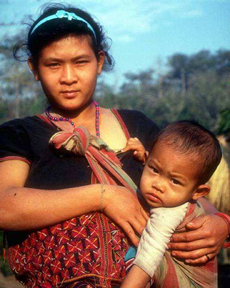The final document does not promote abortion, and many countries put in excellent reservations at the end, affirming the right to life from conception and stating that the family has the primary responsibility for its children. I am so grateful that pro-life President George W. Bush is in charge of the US. He is the best hope for obtaining a culture of life in the world.
—Peter Smith
Society for the Protection of Unborn Children & The International Right to Life Federation
During the 1990s, those of us who were active on the international scene would have asked what you were smoking had you predicted the above quote would someday accurately describe a UN meeting.
 The story during the 90s was a dreary repetition of succeeding UN meetings. Anti-life, anti-family officials had taken control of most of the United Nations delegations. They were radically pro-abortion feminists, for abortion-on-demand from childhood, without parents’ knowledge or consent, in every nation in the world. They saw motherhood as demeaning and marriage as enslavement of women. Teenagers should be supplied with any and all types of contraceptives, for they were to be given total sexual freedom. All of these radical policies were embraced and aggressively promoted by Clinton appointees, Canada, and the nations of the European Union, who led the assault on time honored, traditional values.
The story during the 90s was a dreary repetition of succeeding UN meetings. Anti-life, anti-family officials had taken control of most of the United Nations delegations. They were radically pro-abortion feminists, for abortion-on-demand from childhood, without parents’ knowledge or consent, in every nation in the world. They saw motherhood as demeaning and marriage as enslavement of women. Teenagers should be supplied with any and all types of contraceptives, for they were to be given total sexual freedom. All of these radical policies were embraced and aggressively promoted by Clinton appointees, Canada, and the nations of the European Union, who led the assault on time honored, traditional values.
During the 90s, there were a series of major international meetings called by the UN. The first, onpopulation, was in Rio, the second, a major Women’s Summit in Cairo. This was followed by Beijing, then Istanbul,  Copenhagen, Rome; and in the last few years the action has centered at the UN itself in New York. The pattern at every one of these meetings was the same. The radical forces above had previously set the agenda. The halls swarmed with NGOs (Non Governmental Organizations) which had been credentialed and permitted to lobby at these meetings. Prominent among these was the International Planned Parenthood, International Women’s Health Coalition, Non-Catholic “Catholics for Free Choice,” Center for Reproductive Law and Policy and others. Also arrayed on the radical side were major UN agencies. The most prominent agency was the UN Population Fund but also UNESCO, UNICEF and others.
Copenhagen, Rome; and in the last few years the action has centered at the UN itself in New York. The pattern at every one of these meetings was the same. The radical forces above had previously set the agenda. The halls swarmed with NGOs (Non Governmental Organizations) which had been credentialed and permitted to lobby at these meetings. Prominent among these was the International Planned Parenthood, International Women’s Health Coalition, Non-Catholic “Catholics for Free Choice,” Center for Reproductive Law and Policy and others. Also arrayed on the radical side were major UN agencies. The most prominent agency was the UN Population Fund but also UNESCO, UNICEF and others.
Holding the fort was a disparate coalition of some unlikely allies. This began to come together at the Cairo conference when, in a totally unprecedented and spectacular move, the Holy See sat down with Muslim  nations and worked together with them to try to halt the radical pro-abortion onslaught. A rapid influx into the coalition of pro-life lobbyists from around the world soon produced an informal but very functional and highly effective lobbying counterpart to the radicals. These were almost entirely volunteers, who came at their own expense or were funded privately. They quickly learned how to effectively stall and sometimes block the radical initiatives being proposed. Since the UN reports out of such meetings required consensus, it only took a small number of nations to effectively slow down and sometimes prevent radical statements from emerging. These volunteers were true heroes, on more than one meeting, staying up all night and still lobbying the following morning and afternoon in order to hold together loose coalitions of pro-life nations. The 1990s, overall, were a dreary time. The powerbrokers, the US, Canada and European Union were relentless in pursuit of their radical goals. On a few occasions the US Clinton delegates did pull back when our folks were able to produce a sharp letter from the US House (Chris Smith) or the US Senate (Jessie Helms), which served to somewhat temper the aggressiveness of the Clinton delegates. However, Canada would simply step in to continue the attack.
nations and worked together with them to try to halt the radical pro-abortion onslaught. A rapid influx into the coalition of pro-life lobbyists from around the world soon produced an informal but very functional and highly effective lobbying counterpart to the radicals. These were almost entirely volunteers, who came at their own expense or were funded privately. They quickly learned how to effectively stall and sometimes block the radical initiatives being proposed. Since the UN reports out of such meetings required consensus, it only took a small number of nations to effectively slow down and sometimes prevent radical statements from emerging. These volunteers were true heroes, on more than one meeting, staying up all night and still lobbying the following morning and afternoon in order to hold together loose coalitions of pro-life nations. The 1990s, overall, were a dreary time. The powerbrokers, the US, Canada and European Union were relentless in pursuit of their radical goals. On a few occasions the US Clinton delegates did pull back when our folks were able to produce a sharp letter from the US House (Chris Smith) or the US Senate (Jessie Helms), which served to somewhat temper the aggressiveness of the Clinton delegates. However, Canada would simply step in to continue the attack.
A Momentous Change
Then, President George W. Bush was elected. Since almost all of the US delegation is appointed and does not need Senate confirmation, Mr. Bush was able to fairly quickly replace the Clinton people. An exception was the US Ambassador to the UN. Mr. John D. Negroponte was promptly nominated but his confirmation hearing languished until a few days after the September 11th tragedy when the new war brushed aside partisan political concerns and resulted in his prompt confirmation. Pro-life UN lobbyists were pleased and surprised, as one by one the new Bush appointees arrived. Almost without exception they were pro-life, pro-family and determined to maintain the values directed by President Bush. This resulted in a dramatic, 180-degree change in the policies that the US pursued at the United Nations, to the amazement and total consternation of the radical policy initiatives undertaken during the 90s by the Clinton administration, Canada and the European Union.
 And now came the Child Summit. The World Summit for Children was to be held in the fall of 2001. In the several months before that, preliminary negotiations had become bogged down. Then in a June 2001 meeting, a Canadian delegate inadvertently admitted publicly that the term “reproductive health services” in fact did include abortion. It was unheard of that their treasured phrase would have been so openly and accurately defined by one of their own. At the time it led to pandemonium in the negotiating room and everything came to a halt. Negotiations later proceeded, but were abruptly stopped by the September 11th tragedy, which postponed everything for the next six months.
And now came the Child Summit. The World Summit for Children was to be held in the fall of 2001. In the several months before that, preliminary negotiations had become bogged down. Then in a June 2001 meeting, a Canadian delegate inadvertently admitted publicly that the term “reproductive health services” in fact did include abortion. It was unheard of that their treasured phrase would have been so openly and accurately defined by one of their own. At the time it led to pandemonium in the negotiating room and everything came to a halt. Negotiations later proceeded, but were abruptly stopped by the September 11th tragedy, which postponed everything for the next six months.
Negotiations on the Child Summit document resumed in April 2002. Again there was a deadlock over abortion-related terms. The standoff was the same as it had been in the past, except this time, the leader of the pro-life forces was the United States. Against tremendous pressure from its former allies, the US delegates fought to exclude language from the outcome document that recognized the right of adolescents to abortion, abortion-on-demand, etc. The US delegates fought determinedly to keep the phrase “reproductive  health” out of the document. They also fought against previous wording that would have been destructive of the traditional family, and they sought to delete the phrase “various forms of the family.” While deleting the negatives, the US tried to introduce a totally different way to address reproductive issues. Allied with the US were the previous co-combatants of a number of other nations, plus Muslim countries, including Sudan, Iran, Pakistan and the Holy See, which has no formal vote but nevertheless has influence at the UN. As the time grew short and the deadline of May 10th loomed, frustration grew among the radical delegates while, at the same time, the pro-life, pro-family delegates dug in their heels and held on. Their goal was to negotiate, in good faith, a document that truly protected children. They wanted to and did succeed in largely providing strong provisions against child pornography and child prostitution, as well as protecting children from armed conflicts, all of which had been rejected by the other countries. Finally, of all things, the United States inserted into the document, arguments for sexual abstinence. In the end, the tables had been completely turned, and a major UN meeting had not only held the line on traditional values but had overturned a significant number of previously accepted radical statements from other meetings.
health” out of the document. They also fought against previous wording that would have been destructive of the traditional family, and they sought to delete the phrase “various forms of the family.” While deleting the negatives, the US tried to introduce a totally different way to address reproductive issues. Allied with the US were the previous co-combatants of a number of other nations, plus Muslim countries, including Sudan, Iran, Pakistan and the Holy See, which has no formal vote but nevertheless has influence at the UN. As the time grew short and the deadline of May 10th loomed, frustration grew among the radical delegates while, at the same time, the pro-life, pro-family delegates dug in their heels and held on. Their goal was to negotiate, in good faith, a document that truly protected children. They wanted to and did succeed in largely providing strong provisions against child pornography and child prostitution, as well as protecting children from armed conflicts, all of which had been rejected by the other countries. Finally, of all things, the United States inserted into the document, arguments for sexual abstinence. In the end, the tables had been completely turned, and a major UN meeting had not only held the line on traditional values but had overturned a significant number of previously accepted radical statements from other meetings.
To the absolute delight of our International Right to Life representatives, after adjournment it was soon verified that UN officials now had doubts about future such meetings for fear that more damage would be done to their radical agenda, this being true at least as long as George W. Bush is President of the US. UN population officials have decided against holding a 10-year review to build on the depopulation moves made at the 1994 Cairo world conference.
 When Clinton was in office, UN bureaucrats couldn’t get enough of these meetings to advance their radical agendas. Now, with Bush’s team at the UN, they are losing their taste for a fight. Major UN conferences are usually followed by five-and 10-year review meetings, e.g., Beijing+5 and Rio+10, etc. Now Population Institute President Werner Fornos has called for pushing the review back to 2005. “It is too late to plan for a major international event in 2004.”
When Clinton was in office, UN bureaucrats couldn’t get enough of these meetings to advance their radical agendas. Now, with Bush’s team at the UN, they are losing their taste for a fight. Major UN conferences are usually followed by five-and 10-year review meetings, e.g., Beijing+5 and Rio+10, etc. Now Population Institute President Werner Fornos has called for pushing the review back to 2005. “It is too late to plan for a major international event in 2004.”
Others, however, admitted the real reason it was the new pro-life/pro-family atmosphere created by the USA. The IPPF Director General-Designate said that “the political environment within which global sexual and reproductive health and rights policy is framed is becoming more hostile, with renewed attempts to remove reference to abortion from international consensus documents, global health goals, safe motherhood and other sexual and reproductive health rights-based agendas.” One UN observer noted that 2005 would come after the next US election, when Bush might be out of the White House.
In conclusion, let’s repeat Peter Smith’s quote: I’m so grateful that President George W. Bush is in charge of the US. He’s the best hope for obtaining a culture of life in the world. Our trust, however, should not be in princes but in the Lord God of the universe, who holds the nations in the palm of His hand.

Leave a Reply